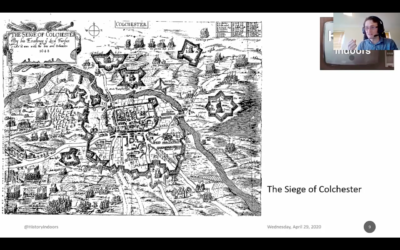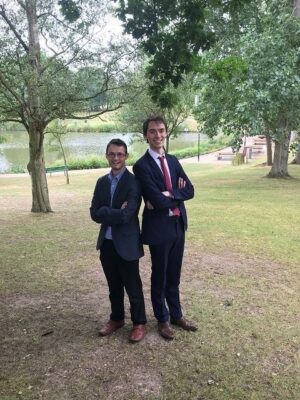Bringing History Indoors during a Pandemic
01 December 2020 – Michael Sewell and Steven Bishop
Editor’s note: How have local communities interacted with historians during the time of the COVID-19 pandemic? This post introduces the History Indoors project by two graduate students at the University of Essex. History Indoors helps bring a wide array of historical topics to a general audience around the UK and the world.
When the UK and much of the world went into quarantine in March to halt the spread of COVID-19, public history talks ceased almost immediately—but the desire and the time to consume history instantly increased. Researchers from the history department at the University of Essex recognized this and seized the opportunity to bring history to people’s homes by creating the organization History Indoors. Founded by Ph.D. researchers Michael Sewell and Lewis Smith, History Indoors aims to reach people in quarantine with free history talks that focus on our historical research. The project has featured talks on topics ranging from Ancient Athens to twentieth-century consumerism, from local conflicts to colonialism. Due to the quarantine, people were stuck inside their homes and could not even see loved ones, let alone visit historical sites. (The UK government banned all non-essential travel.) The project was a way of helping people through the pandemic and by providing them the chance to feel engaged with the past even though they were stuck at home.

A screenshot from History Indoor’s inaugural talk, weaving local history into the broader topic of the British Civil War. Courtesy of the authors.
We pitched these talks at around 20 to 30 minutes on Zoom. The talks also included a Q&A session at the end, as we did not want to make this just a passive intake of knowledge but to allow people to ask questions and bring their own histories into the discussion. For those who desired more academic debate, we began filming a roundtable discussion in which we delved deeper into the topics covered in the talks. As interest grew, we also began producing short educational videos, film reviews, and podcasts which could be found alongside recordings of the talks on multiple mediums such as YouTube and Anchor (a podcast hosting service).
As well as being a platform through which we could deliver talks to people at home, the project also allowed the Ph.D. community at the Universities of Essex and (recently) Winchester to meet virtually and do something together, which helped us all during the time of lockdowns and separations. It ensured that many of us stayed in communication. And while research slowed because archives and libraries were shut, it allowed us to publicly reach people with our research and historical interests.
The Challenges
Six months later, however, our follower count on social media platforms has grown at a much slower rate. To date, we have almost 1,000 followers on Twitter, 150 on Facebook and 100 on Instagram. Our social media team imagined creative ways to increase our engagement with our followers other than the simple use of hashtags, ranging from monthly book giveaways and weekly quizzes on Twitter and Instagram, to engagement with local community groups on Facebook. Our diligent daily efforts at trying to widen our reach has achieved a slow but steady rise in followers. We trust that the tortoise, not the hare, will win the race.
Yet we have discovered that traditional forms of media have been equally (if not more) important in widening our reach to our local communities. Based in the region of East Anglia in the UK, our team soon got in contact with local radio stations and newspapers. To date, we have been interviewed on BBC Radio Suffolk and BBC Essex numerous times to advertise our talks and our historians have been used by regional TV and radio for their expertise on contemporary issues, such as the debate surrounding statues and the parallels between COVID-19 and the Spanish Flu pandemic of 1918. Our weekly advertisement of our latest talks in the Daily Gazette, a local newspaper in the town of Colchester, reaches a weekly readership of 150,000 people. It has also allowed us to reach a broader age demographic: while Twitter users are predominantly under the age of 50, the over-50s comprise the largest age group of radio listeners, and the median age of many UK newspapers is over 50 as well. [1] Therefore both digital and traditional forms of media have been integral to our central aim of bringing history talks to as many people’s homes as possible.
The Audience
Because of this broad demographic, we’ve been forced to consider how we tailor our talks to them. Plenty of other great history projects sprung up at similar times during the pandemic (for example History Hack and History Begins at Home). How could we stand out from the crowd? We soon realized that our niche was our team of historians who had both the breadth of historical interests and the depth of academic rigor. We truly believed we could make a talk on the Spanish Conquest of the Americas appeal to local audiences in Ipswich and talks on East Anglian history appeal to people around the globe. We thus took a threefold approach. First, where we could, we would deliver talks on local history topics like the USAAF in East Anglia and the history of Colchester. Second, in our broader talks on national/international history, we endeavored to provide links to East Anglia, such as in our US History through East Anglian statues series. Lastly, if we couldn’t include a local element in our talks, we tried to keep the historical theme as broad as possible (e.g. the British Civil War) to avoid niche topics. Through this approach, our international audience has learned about local histories here in England, while local people have discovered international histories. Examples of this can be found with our talks on Central America or the Experience of Eurasians in Malaya in the twentieth century. To date our best-attended talk has been on the East Anglian witchcraft trials, reaching a live audience of over seventy people.
This approach underpins our belief that the academic disciplines of history and public history can (and should) work together in deepening the public’s knowledge and fervor for the past. Furthermore, we hope we are helping dispel the reputation some universities carry of being distant from their local area. One tangible way of measuring how successful we will have been in doing this will be through our inaugural History Indoors conference in 2021, which we aim to host outside of the university campus and in the heart of Colchester when COVID-19 restrictions are lifted, or online using software such as Zoom, if necessary.
The Future
We hope to continue History Indoors for as long as possible, beyond the COVID-19 situation, as it offers a new way for the public around us to interact with important historical topics. However, the immediate future looks bright: we have talks lined up throughout 2021 and we are about to have our talks featured on the online streaming service History Hit by the end of the year, which will give our talks a potential audience of nearly one million people. This just highlights just how far-reaching the project has become and points to its increasing potential. We hope that even when the pandemic dissipates, people will still love to come to our talks, especially as they will never have to leave their homes to attend! If you would like to find out more about this project and about the team of historians, you can check us out here. We would love to see you at one of our talks in the future!
[1] https://www.pewresearch.org/internet/2019/04/24/sizing-up-twitter-users/; https://www.statista.com/statistics/806769/radio-listeners-by-age-worldwide/; https://www.inter-media.co.uk/uk-newspapers-reveal-readership-demographics/
~Michael Sewell graduated from the University of Winchester with a BA and MA. His research focused on changing memory and use of conflict. He is currently a PhD candidate at the University of Essex. His research examines the use of the British Civil Wars and their impact on local identities. You can see his full academic profile here.
~Steven Bishop is part of the History Indoors advertising team and is currently a part-time PhD student at the University of Essex, researching controversial historical statues. He is also a qualified kindergarten teacher and works in education alongside his studies.





This pandemic has forced so many industries to think outside the box with how to continue their overall mission. Historians have had to make, for lack of a better word quickly modernize their approach to public outreach. I hope that History Indoors finds continued success far beyond the pandemic.